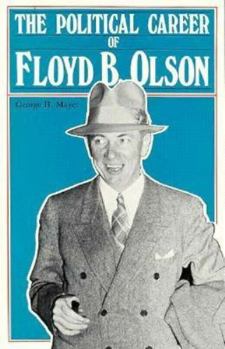< Back to Search Results
Political Career of Floyd B. Olson
Select Format
Select Condition 
Book Overview
An extraordinary political leader who forged Minnesota's successful Farmer-Labor coalition during the 1920s and 1930s, Governor Olson was a powerful, charismatic, and complex personality. In this fascinating biography Mayer describes the man and his turbulent times.
Format:Paperback
Language:English
ISBN:0873512065
ISBN13:9780873512060
Release Date:June 1987
Publisher:Minnesota Historical Society Press
Length:351 Pages
Weight:1.16 lbs.
Dimensions:0.9" x 5.5" x 8.5"
Customer Reviews
1 rating
The New Deal and Its Discontents
Published by Thriftbooks.com User , 17 years ago
Franklin Delano Roosevelt had his vehement critics, but they were not all conservatives or plutocrats. FDR had plenty of articulate supporters among the educated and wealthy - his own social class, and wealth and education largely overlapped in that bygone America - from whom he selected many of his administrators and judicial appointments. Few other presidents have ever led more bi-partisan administrations. IN fact FDR's most adamant opponents were often Southern Democrats, those moss-backed racist reactionaries who eventually morphed into Dixiecrats and then into the Red State Republicans of today. Isolationists of both parties, often from the far west, also blocked FDR whenever possible, and a genuine American "right wing" manifested itself in the followers of Father Coughlin. However, the most serious challenge to FDR's popularity came from critics who considered him too cautious and conservative; in several states, the successors to Populism threatened effective third party movements - Huey Long, as the heir of Southern Populism, and Floyd B. Olson as the champion of labor-oriented Northern Populism. Olson rose to prominence in Minnesota politics during his tenure as Hennepin County Attorney, when he effectively prosecuted the Ku Klux Klan and the Minnesota Citizens Alliance, a violence-prone anti-union organization. In 1924, he supported Robert LaFollette's candidacy for the presidency on the Progressive ticket, and he ran for governor himself as the Farmer-Labor Party candidate. He nearly won, with 43% of the vote against 48% for thr Republican and 6% for the Democratic candidates. In 1930, Olson was elected to the first of three terms as America's first Farmer-Labor governor. While in office, despite a Republican-controlled legislature, Olson crafted and pushed though bills that instituted progressive state income taxes, state social security, environmental protections, equal pay for women, a minimum wage, and unemployment insurance. Sound familiar? George H. Mayer's biography, "The Political Career of Floyd B. Olson," focuses much of its attention on Olson's uncomfortable relationship with FDR, whom he seemingly regarded as timid and equivocal in his reforms. Olson was widely perceived as a rival of FDR, but in 1936 he declined to run for president on a third-party ticket; had he run, FDR would almost certainly have lost to his Republican opponent. Olson never had a chance to reconsider his decision; he died of stomach cancer the same year. Olson was not the only labor-oriented reformer who expressed discontent and disappointment with FDR's New Deal, but he was easily the most prominent and politically savvy. George Mayer's book, written in 1950, is hardly the most excitingly styled biography one could imagine, though it was thoroughly researched. It's the only biography available, however, of one of the major figures of American politics in the 1930s. Olson is not forgotten, not in Minnesota anyway, where statues of him stand in fro






